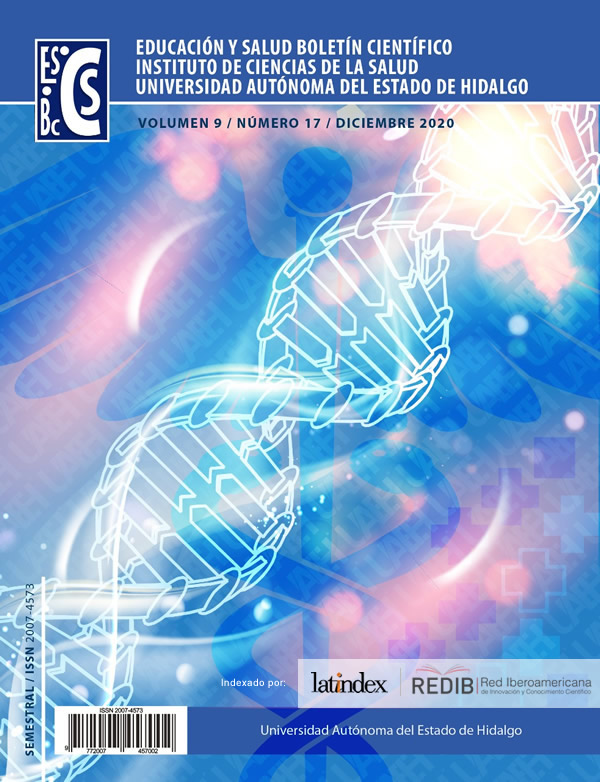Lack of knowledge as a risk factor for contracting COVID-19: What are we facing?
DOI:
https://doi.org/10.29057/icsa.v9i17.6358Keywords:
Misinformation, COVID 19, socioeconomic status, risk factorAbstract
Objective: To identify the risk factors in the socioeconomic environment, which makes us as a university community, to develop infection by SARS-CoV2.
Methodology: A 20-item tool assessed participants' knowledge of COVID-19. Questions related to age, gender, socioeconomic status, educational level, place of origin, religion, source of information used, and preventive measures against COVID-19 were included.
Results: The average age of the participants were 25.1 years, 62.5% being female and 37.5% male, 34 participants practicing Catholicism and 4 Christianity and its variants. A third belong to an urban locality and a minority of 3% belong to a rural locality, 55%, of the households of families do not have studies. Scientific dissemination texts predominate as a source of information, 23 people have left their home 1-3 times. In the event of going out into the street, 32 people responded that they use face masks, they all have the resources to purchase one. In public places 96.9% maintain a healthy distance, 18 people had contact with a suspect or confirmed patient with COVID-19 infection.
Conclusions: Distinguishing between misinformation and mistrust driven by inequality and moving away from the language of "conspiracy beliefs" can help avoid pushing people to endorse misinformation, as well as disseminating appropriate prevention measures and informing about the risk factors of COVID-19 to nearby communities to reduce the risk of infection.
Downloads
Publication Facts
Reviewer profiles N/A
Author statements
Indexed in
- Academic society
- N/A
References
Mian, A., & Khan, S. Coronavirus: the spread of misinformation.[internet].US National Library of Medicine National Institutes of Health (2020, 18 marzo). https://www.ncbi.nlm.nih.gov/pmc/articles/PMC7081539/
Yang G, Qing C, Zhong H, Yuan T, Shou C, et al. The origin, transmission and clinical therapies on coronavirus disease 2019 (COVID-19) outbreak – an update on the status. Mil Med Res https://www.ncbi.nlm.nih.gov/pmc/articles/PMC7068984/
Singh DR, Sunuwar DR, Karki K, Ghimire S, Shrestha N. Knowledge and Perception Towards Universal Safety Precautions During Early Phase of the COVID-19 Outbreak in Nepal. J Community Health. 2020 May 13:1–7. [Internet] https://www.ncbi.nlm.nih.gov/pmc/articles/PMC7220640/
Jaiswal, J., LoSchiavo, C., & Perlman, D. C.Disinformation, Misinformation and Inequality-Driven Mistrust in the Time of COVID-19: Lessons Unlearned from AIDS Denialism. US National Library of Medicine National Institutes of Health. (2020, 21 mayo). [Internet] https://www.ncbi.nlm.nih.gov/pmc/articles/PMC7241063
Cuan-Baltazar, J. Y., Muñoz-Perez, M. J., Robledo-Vega , C., Pérez-Zepeda, M. F., & Soto-Vega, E. Misinformation of COVID-19 on the Internet: Infodemiology Study. National Library of Medicine National Institutes of Health. [Internet] (2020, 9 abril) https://www.ncbi.nlm.nih.gov/pmc/articles/PMC7147328/
Gottlieb, M., & Dyer, S. (2020). Information and Disinformation: Social Media in the COVID-19 Crisis. Academic emergency medicine : official journal of the Society for Academic Emergency Medicine, 10.1111/acem.14036. https://pubmed.ncbi.nlm.nih.gov/32474977/
Vera-Romero Oscar, Vera Romero Franklin(2015). Evaluation of the socioeconomic status: presentation of a scale adapted in a population from Lambayeque. Rev. cuerpo med HNAAA(6)1http://sisbib.unmsm.edu.pe/bvrevistas/cuerpomedicohnaaa/v6n1_2013/pdf/a09v6n1.pd
Vera-Romero Oscar, Vera Romero Franklin(2015). Evaluation of the socioeconomic status: presentation of a scale adapted in a population from Lambayeque. Rev. cuerpo med HNAAA(6)1http://sisbib.unmsm.edu.pe/bvrevistas/cuerpomedicohnaaa/v6n1_2013/pdf/a09v6n1.pd
Muñoz Acosta, manolo , el pensamiento crítico y las creencias religiosas, Sophia, Colección de Filosofía de la Educación, núm. 24, 2018,Universidad Politécnica Salesiana[internet] [ citado el 17 junio 2020] http://dx.doi.org/10.17163/soph.n24.2018.06
Hart, C.W., Koenig, H.G. Religion and Health During the COVID-19 Pandemic. J Relig Health 59, 1141–1143 (2020)[ internet]. https://doi.org/10.1007/s10943-020-01042-3
Khan S, Liu J, Xue M. Transmission of SARS-CoV-2, Required Developments in Research and Associated Public Health Concerns. Front Med (Lausanne). 2020 Jun 9;7:310-318. https://www.ncbi.nlm.nih.gov/pmc/articles/PMC7295900/
Bavel, J.J.V., Baicker, K., Boggio, P.S. et al. Using social and behavioural science to support COVID-19 pandemic response. Nat Hum Behav 4, 460–471 (2020) .https://doi.org/10.1038/s41562-020-0884-z
Lescure F, Bouadma L, Nguyen D, Parisey M, Wicky P, Behillil S et al. Clinical and virological data of the first cases of COVID-19 in Europe: a case series [Internet]. PUBMED. 2020 [cited 3 May 2020]. Available from: https://pubmed.ncbi.nlm.nih.gov/32224310/
Kaufman B, Whitaker R, Pink G, Holmes G. Half of Rural Residents at High Risk of Serious Illness Due to COVID-19, Creating Stress on Rural Hospitals [Internet]. Pubmed.gov. 2020 https://pubmed.ncbi.nlm.nih.gov/32603030/
Alonso-Galbán, P., & Alemañy-Castilla, C. (2020). Curbing Misinformation and Disinformation in the COVID-19 Era: A View from Cuba. MEDICC review, 22(2), 45–46. [Internet] [ 23 junio 2020] https://pubmed.ncbi.nlm.nih.gov/32478708/
Levin J. The Faith Community and the SARS-CoV-2 Outbreak: Part of the Problem or Part of the Solution? [Internet]. US National. Library of Medicine National Institutes of Health. 2020 https://www.ncbi.nlm.nih.gov/pmc/articles/PMC7265665/



















